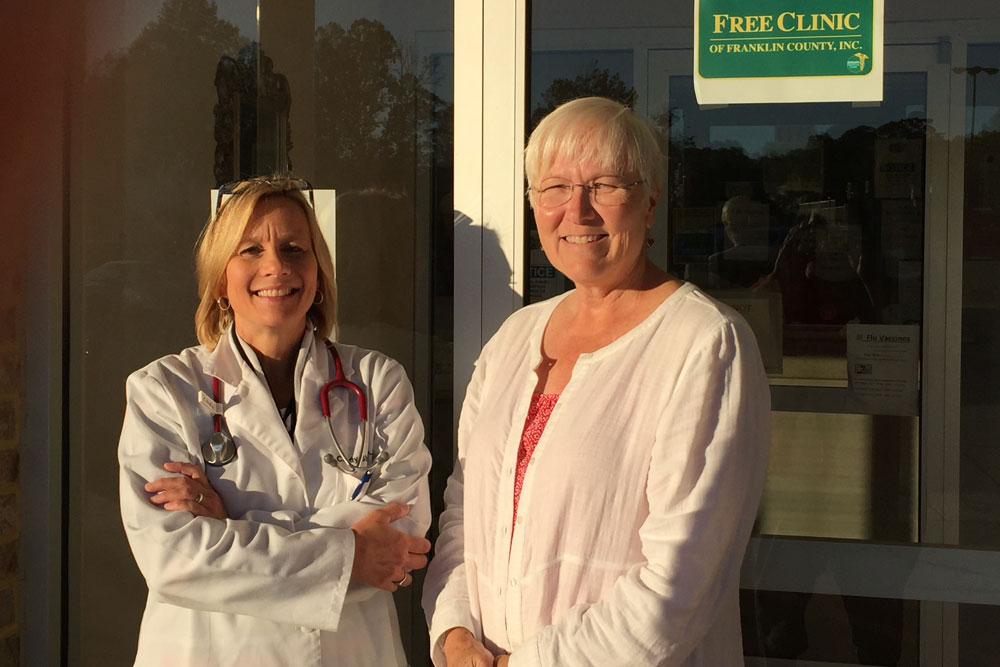The Mental Health Gateway

For family nurse practitioner Cynthia Shively, good health care begins far upstream, with proper preventative care along the way. But unlike vaccinations, blood pressure and vision checks, which come at regular intervals, specific care for patients’ mental health often doesn’t come until a crisis is at hand – a point that it’s often too late.
One in five Americans suffers from a mental illness, so basic mental health screenings are a routine part of every nurse practitioner’s job, explains Shively, the sole, full- time clinician at the Free Clinic of Franklin County, in Rocky Mount, VA, which has nearly 800 patients on its roster.
But since starting there in 2013, Shively often felt ill-equipped when it came to understanding how best to help people with complex health problems rooted in mental illness. It’s why the long-time nurse determined that heading back to school again at age 50 in pursuit of a post-master’s certificate in psychiatric-mental health nursing was imperative to her work. And thanks to a Virginia Healthcare Foundation grant, she’s got financial help as she progresses through UVA’s two year post-master’s program in mental health nursing.
“I like the nursing approach because we look at patients’ homes, their family situation, their environment, what else is affecting their health and well-being, as well as their sicknesses,” says Shively. “But we do it in that order. As a country, we’re starting to realize that you can’t just fix everything at the end, once it’s broken; you have to put in the work upstream, before things go south, when it’s really important.”
Already, Shively is accustomed to looking at systems. She recalls her own seven year journey to earn an associate’s degree in nursing, after marrying and beginning a family, when she worked a line job at a textile factory. With NAFTA’s signing, she knew her job wouldn’t be around for long, stress that helped compel her forward professionally. Today, she tends many individuals who experience similar instability, are unemployed, uninsured, disabled, and often suffer from the cascade of mental health issues that come with such upheaval. To treat them, she follows nursing’s systems approach:
How do your health issues affect your mood? She’ll ask her patients. Do they affect your sleep? What’s your appetite like, and has that changed?
“Sometimes, as I probe, they just begin to cry,” says Shively, noting that depression is the leading cause of disability in the US. “Sometimes they’ve lost their jobs and their insurance, and wind up with us already on numerous medications, like antidepressants, mood stabilizers, antipsychotics. As a family nurse practitioner, I’ve felt less than adequate addressing all these mental health medications and prescribing more – and knew I needed to learn more.”
Until now.
With weekly live, online classes, Shively calls UVA School of Nursing’s post-master’s psych mental health track “manageable,” even with a full-time job and a family. She also says the information she’s learning is helping her in real time address her patients’ myriad needs, and cementing her belief in the interconnectedness of mental and physical health.
“Already, I’ve learned so much in the program,” says Shively, who lives in Ferrum, Va. “Antidepressants’ and antipsychotics’ side effects, different pearls about drug combinations, and the fact that many, many of these drugs are used off label, experimentally. It’s also amazing to me what the research and the texts are saying now, in 2017, that’s different than what I remembered from my schooling back in 2009 and 2010. Genetics, we’re realizing, are a huge contributor to mental health, too.”
And while some in her program will use their degrees to pivot into a new profession, Shively says it won’t change her day job; it’ll enhance it.
“My hope is to be able to judiciously and knowledgably help people that I cross paths with,” she says. “Human beings are not comfortable talking about their feelings, but I find, if you just ask a little bit more deeply, and really listen, many people will tell you.
"Listening – really listening – is probably 80 percent of caregiving.”
###
